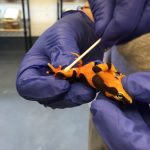
New wildflower meadow bolsters biodiversity

Establishing a wildflower meadow at King’s College, Cambridge bolstered biodiversity and reduced greenhouse gas emissions
A new study examining the effects of planting a wildflower meadow in the historic grounds of King’s College, Cambridge (UK) has demonstrated its benefits to local biodiversity and climate change mitigation.
The study, led by King’s Research Fellow Dr Cicely Marshall, found that establishing the meadow had made a considerable impact on the wildlife value of the land, while reducing the greenhouse gas emissions associated with its upkeep.
Marshall and her colleagues, among them three King’s undergraduate students, conducted biodiversity surveys over three years to compare the species richness, abundance and composition supported by the meadow and adjacent lawn.
They found that, in spite of its small size, the wildflower meadow supported three times as many species of plants, spiders and bugs, including 14 species with conservation designations.
Terrestrial invertebrate biomass was found to be 25 times higher in the meadow, with bat activity over the meadow also being three times higher than over the remaining lawn.
As well as looking at the benefits to biodiversity, Marshall and her colleagues modelled the impact of the meadow on climate change mitigation efforts, by assessing the changes in reflectivity, soil carbon sequestration, and emissions associated with its maintenance.
The reduced maintenance and fertilisation associated with the meadow was found to save an estimated 1.36 tonnes CO2-e per hectare per year when compared with the grass lawn.
Surface reflectance increased by more than 25%, contributing to a reduced urban heat island effect, with the meadow more likely to tolerate an intensified drought regime.

Increased meadow planting
The study also assessed the perception of the meadow and attitudes towards increased meadow planting across the Cambridge University estates.
The team found the Cambridge community to be overwhelmingly in favour of increased meadow planting in place of lawns, with only 1.4% preferring entirely lawn, although respondents were clear that meadow planting should be in conjunction with maintaining or increasing access to green space for recreation.
Marshall, who is also a researcher in the University of Cambridge’s Department of Plant Sciences, commented: “There’s no doubt that the introduction of the meadow has been an unqualified success; not only has it had a hugely beneficial impact on our biodiversity within the College, but it’s also captured the imagination of so many people across the city and beyond.”
Provost of King’s, Professor Michael Proctor, added: “The wildflower meadow has inspired us to think more about how we look after and enhance our biodiversity, and has brought to attention just how much has been lost.
“We hope its presence in this iconic setting will motivate others to think about sustainability and to consider planting their own meadows elsewhere.”
The study is published in the journal Ecological Solutions and Evidence.

Image 1: The meadow replaces the iconic lawn behind King’s College Chapel. Credit: Geoff Moggridge.
Image 2: Before its transformation, the area behind King’s College Chapel was a fine lawn - which visitors were not permitted to walk on. Credit: King’s College, Cambridge.
Image 3: A section of the iconic Back Lawn at King’s College, Cambridge has been transformed into a wildflower meadow. Credit: Geoff Moggridge
















